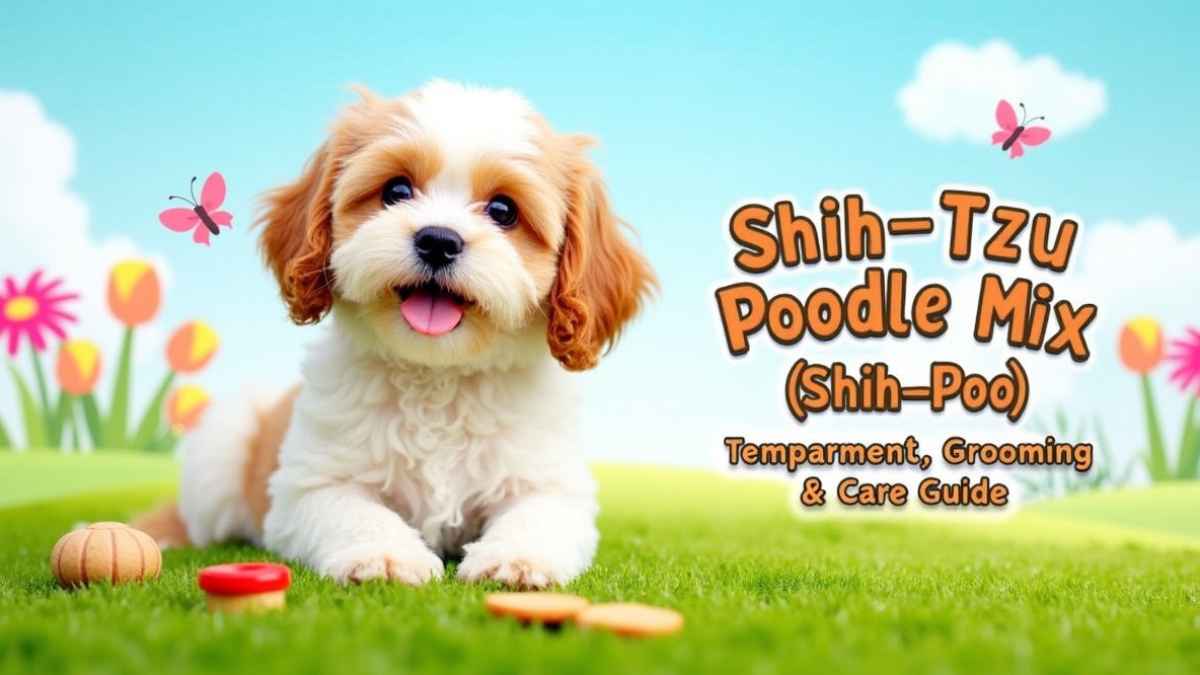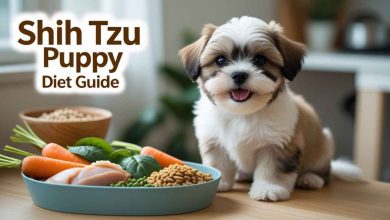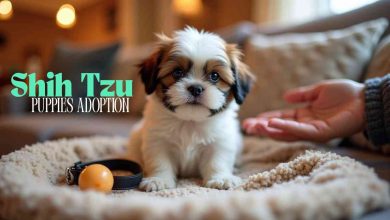Shih Tzu Poodle Mix (Shih-Poo): Temperament, Grooming & Care Guide

The Shih Tzu Poodle mix, also known as the Shih-Poo or Shih Poo dog, is one of the most lovable designer dog breeds. With a charming blend of elegance, intelligence, and affection, this hybrid has steadily climbed the ranks among sought-after companions. A cross between the regal Shih Tzu and the clever Miniature or Toy Poodle, the Shih-Poo offers a unique package of personality, minimal shedding, and adaptability to various lifestyles.
What is a Shih Tzu Poodle?
The Shih Tzu Poodle, or Shih-Poo, is a deliberate crossbreed created to blend the best traits of the two parent breeds. From the Shih Tzu side comes loyalty and an affectionate nature, while the Poodle side contributes keen intelligence and a hypoallergenic coat. This breed is not recognized by traditional kennel clubs like the AKC but enjoys immense popularity among modern dog enthusiasts.
A Brief Introduction to the Breed
Born out of a desire to develop a low-shedding, affectionate lap dog, the Shih-Poo has rapidly become a preferred pet for families, singles, and seniors alike. It thrives in both apartments and larger homes and adapts easily to the pace of its owner. This dog isn’t just cute; it’s practical for many lifestyles.
Physical Traits that Make Shih-Poos Stand Out
Shih-Poos generally weigh between 7 to 20 pounds and stand around 8 to 15 inches tall. Their size and appearance vary based on the parent genetics, but they often have a round face, dark expressive eyes, and soft, curly or wavy fur. Their coats can range in color from white, black, and brown to apricot, grey, or multi-colored. If you’re wondering about Shih Poo size, they fit perfectly into the small breed category, making them ideal for indoor lifestyles.
Understanding the Shih-Poo Temperament
The temperament of a Shih-Poo is one of its most appealing features. This breed is known for being affectionate, gentle, and eager to please. They form strong bonds with their families and enjoy being the center of attention. While friendly, some may inherit a shy streak, especially around strangers. They rarely show aggression and tend to get along well with children and other pets.
Shih Tzu Poodle behavior typically includes being alert yet calm, social yet slightly clingy, and always people-focused. These dogs are smart, curious, and responsive to training when done patiently. Their playful spirit makes them enjoyable to be around, while their calm side makes them ideal cuddle companions.
Grooming and Care Essentials
Maintaining a Shih-Poo’s coat requires dedication. Their fur can become easily tangled or matted without regular care. Daily brushing is recommended, especially for those with longer or curlier coats. Regular grooming appointments every 6 to 8 weeks keep them tidy. If you’re asking, how to groom a Shih Poo, the key lies in consistency and using proper tools designed for curly or double coats.
Bathing should be done every 3 to 4 weeks or when the coat gets dirty. Don’t forget nail trimming, ear cleaning, and dental care—all are part of responsible grooming. Their ears, in particular, need attention to prevent infections, a common concern for floppy-eared dogs. Shih Poo grooming also involves frequent eye cleaning to avoid tear stains.
Exercise Needs
Despite their size, Shih-Poos need daily activity. Moderate exercise like two short walks a day and some indoor play keep them mentally and physically healthy. They love fetch, tug-of-war, and puzzle toys. While energetic, they are not hyperactive and do not require a large yard to be happy.
Training and Social Behavior
Training a Shih-Poo is typically a pleasant experience. They are smart, quick learners who enjoy positive reinforcement. Short, consistent sessions work best. However, they can have moments of stubbornness, especially if they inherit more from the Shih Tzu side.
Socializing them early is key. Exposing your Shih-Poo to different people, places, and sounds helps build confidence and reduces anxiety. Crate training and basic commands should start young.
Common Health Concerns
As a mixed breed, the Shih-Poo may be less prone to hereditary diseases than purebreds, but that doesn’t mean they are immune. Some potential issues include:
- Dental disease due to small mouth structure
- Patellar luxation, or dislocated kneecaps
- Eye problems such as cataracts or dry eye
- Skin allergies and ear infections
Regular vet checkups, a healthy diet, and routine care go a long way in preventing complications. The average lifespan of a Shih-Poo is between 10 to 17 years, and many live long, joyful lives when properly cared for. Wondering, is Shih Poo hypoallergenic? Yes — most Shih-Poos are considered low-shedding and suitable for mild allergy sufferers.
Living with a Shih-Poo
Shih-Poos are adaptable and make excellent apartment dogs. They don’t need vast spaces to thrive but do need attention and affection. They can become anxious or depressed if left alone for extended periods.
Their sensitivity and companionship make them wonderful therapy or emotional support animals. They’re happiest in homes where they can be near their humans.
Feeding and Nutrition
Feeding a Shih-Poo should involve a balanced, high-quality diet. Choose food designed for small breeds, rich in protein and low in fillers. Treats can be used for training, but overfeeding leads to weight gain. Divide meals into two portions daily and always provide clean water.
Discuss with your vet whether supplements like omega-3s or probiotics are beneficial, especially for skin and digestion.
Cost of Owning a Shih-Poo
The cost of a Shih-Poo varies depending on lineage, breeder reputation, and location. Puppies can cost anywhere from $1,200 to $4,000. If adopting, the fee may be significantly lower. Ongoing expenses include grooming, vet visits, food, training, and pet insurance.
Annual ownership costs average between $1,000 to $1,800, though this can vary based on health and grooming needs.
Pros of Owning a Shih-Poo
- Hypoallergenic qualities with low shedding
- Affectionate and loving companion
- Compact size suited for small homes
- Generally friendly with kids and other pets
- Eager to learn and responsive to training
Cons to Consider
- Grooming is time-intensive and costly
- Can develop separation anxiety
- May be prone to barking if not trained
- Inherited health risks from both breeds
Weighing these pros and cons is essential before bringing a Shih-Poo home.
Adoption vs. Breeder
Always do your research when getting a puppy. Reputable breeders provide health clearances and early socialization. Avoid pet stores or online listings with no background checks.
Adoption is a compassionate option. Many Shih-Poos end up in shelters or breed-specific rescues due to no fault of their own. Giving one of these dogs a second chance can be incredibly rewarding.
Tips from Real Shih-Poo Owners
Real-life owners report that their Shih-Poos are deeply loyal, sometimes to the point of being “velcro dogs.” Many note their dogs’ sensitivity to emotion and mood, offering comfort during stressful times. Others point out how expressive their Shih-Poo is, communicating with whines, tail wags, and eye contact.
Crucially, they all agree on one thing: daily grooming is a must if you want to avoid matting.
Conclusion
The Shih Tzu Poodle mix is a delightful blend of charm, brains, and beauty. With the right care, training, and affection, Shih-Poos grow into well-behaved, loving companions. Their moderate exercise needs, hypoallergenic coats, and adaptable nature make them perfect for many households. Whether you’re a first-time dog owner or a seasoned pet parent, the Shih-Poo is a breed worth considering. With their big hearts and adorable looks, they don’t just fill homes—they fill hearts.
If you’re looking for a dog that offers unwavering loyalty, cuddles on the couch, and a coat as soft as silk, the Shih-Poo might just be the best match for your life.
Discover if the Shih-Poo is the perfect fit for your home.




